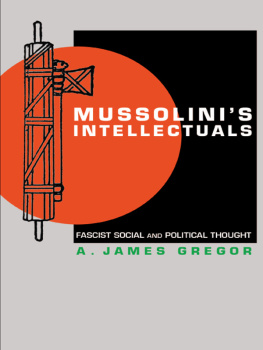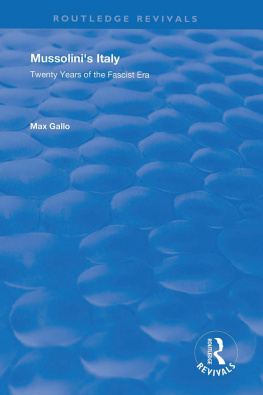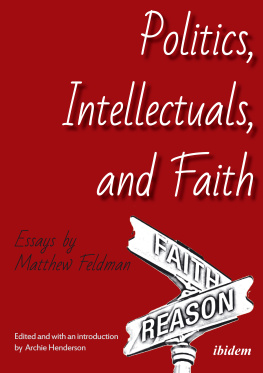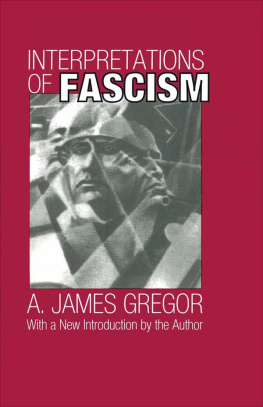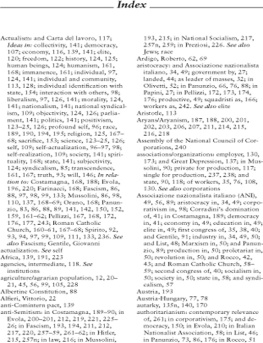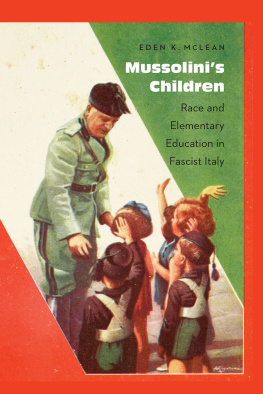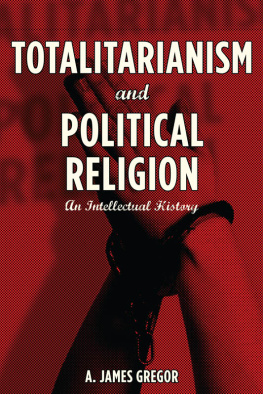Gregor A. James - Mussolinis Intellectuals: Fascist Social and Political Thought
Here you can read online Gregor A. James - Mussolinis Intellectuals: Fascist Social and Political Thought full text of the book (entire story) in english for free. Download pdf and epub, get meaning, cover and reviews about this ebook. City: Italy;Princeton, year: 2009;2008, publisher: Princeton University Press, genre: Politics. Description of the work, (preface) as well as reviews are available. Best literature library LitArk.com created for fans of good reading and offers a wide selection of genres:
Romance novel
Science fiction
Adventure
Detective
Science
History
Home and family
Prose
Art
Politics
Computer
Non-fiction
Religion
Business
Children
Humor
Choose a favorite category and find really read worthwhile books. Enjoy immersion in the world of imagination, feel the emotions of the characters or learn something new for yourself, make an fascinating discovery.
- Book:Mussolinis Intellectuals: Fascist Social and Political Thought
- Author:
- Publisher:Princeton University Press
- Genre:
- Year:2009;2008
- City:Italy;Princeton
- Rating:3 / 5
- Favourites:Add to favourites
- Your mark:
- 60
- 1
- 2
- 3
- 4
- 5
Mussolinis Intellectuals: Fascist Social and Political Thought: summary, description and annotation
We offer to read an annotation, description, summary or preface (depends on what the author of the book "Mussolinis Intellectuals: Fascist Social and Political Thought" wrote himself). If you haven't found the necessary information about the book — write in the comments, we will try to find it.
Mussolinis Intellectuals: Fascist Social and Political Thought — read online for free the complete book (whole text) full work
Below is the text of the book, divided by pages. System saving the place of the last page read, allows you to conveniently read the book "Mussolinis Intellectuals: Fascist Social and Political Thought" online for free, without having to search again every time where you left off. Put a bookmark, and you can go to the page where you finished reading at any time.
Font size:
Interval:
Bookmark:
MUSSOLINIS INTELLECTUALS
MUSSOLINIS INTELLECTUALS
FASCIST SOCIAL AND POLITICAL THOUGHT
A. James Gregor
PRINCETON UNIVERSITY PRESSPRINCETON AND OXFORD
Copyright2005 by Princeton University Press
Published by Princeton University Press,
41 William Street, Princeton, New Jersey 08540
In the United Kingdom: Princeton University Press,
3 Market Place, Woodstock, Oxfordshire OX20 1SY
All Rights Reserved
Library of Congress Cataloging-in-Publication Data
Gregor, A. James (Anthony James), 1929
Mussolinis intellecrtuals : fascist social and political thought /A. James Gregor.
p.cm.
Includes bibliographical references and index.
eISBN: 978-1-40082-634-6
1. FascismItalyHistory20th century. 2. IntellecrtualsItalyHistory20th century. 3. IntellecrtualsItalyPolitical acrtivityHistory20th century. 4. ItalyIntellecrtual life20th century. 5. ItalyPolitics and
government20th century. I. Title.
DG571.G734 2005
320.53'3'094509042dc222004049133
British Library Cataloging-in-Publication Data is available
This book has been composed in Sabon
Printed on acid-free paper.
pup.princeton.edu
Printed in the United States of America
1 3 5 7 9 10 8 6 4 2
The work embodied in this book is dedicated
to all those who, willingly and unwillingly,
accompanied me on my journey.
Contents
Preface
THIS BOOK appears after almost four decades of study, conferences, discussion, and publication. Over those years, students of fascism,
From a political revolution entirely without any pretense of a rational belief system, we are now told, by those best informed, that fascisms ability to appeal to important intellectuals... underlines that it cannot be dismissed as... irrational.... [In] truth, fascism was an ideology just like the others.
In effect, the study of Italian Fascism has delivered itself of significantly altered assessments over the past decades. Where, at one time, Fascism was simply dismissed as a phenomenon understood to be without intellectual substance, a right-wing excrescence that invoked violence and war, it is now more and more regularly understood to be a movement, and a regime, predicated on a reasonably well articulated belief system that engaged the rational commitment of many.
For all that, there remains a residue of opinion that continues to deny Fascism the same reasoned beliefs that everyone readily grants to the political movements and regimes of Joseph Stalin or Mao Zedong.We are still told, for example, that unlike Stalinism and Maoism, Fascism had few true believers who could also write articles and books. Strange.
One of the principal purposes of the present work is to attempt to challenge such notions. Fascist intellectuals wrote and published as many articles and books as apologists for any comparable system. Their quality varied with each author, just as was, and is, the case with comparable systems. It would be hard to convincingly argue that the intellectual yield of authors in the former Soviet Union or Maoist China was superior in any way to that produced by Fascist intellectuals. The expository account, before the reader, is evidence in support of that contention.
In that context, there is a discussion made available in the present exposition that has struck several prepublication readers as anomalous. Considerable space in the text is devoted to the eccentric and suprarational vagaries of Julius Evola. The reason is that there are some specialists who seem to think that Evola was a major Fascist intellectual, and that he provided the rationale for Ur-fascismthe belief system that animated Fascism and all the forms of neofascism with which scholarship now occupies itself. Moreover, Evolas notions do document the impact of National Socialist thought on the coherence and fundamental rationality of Fascist doctrine.
This book is essentially the conclusion of an argument I first advanced a long time ago. Long resisted by my peers, the central claimthat Fascism was, in fact, animated by a credible and coherent belief systemhas now been generally accepted by those best informed. Acknowledging that, I believe that the retrospective study of Italian Fascismand the inquiry into what passes, in our immediate present, as neofascismcan only prosper
Alongside all the volumes devoted to the lucubrations of Soviet, Chinese, East German, North Korean, and Albanian intellectuals in support of their respective Marxist-Leninist dictatorships, there is space for this one. It argues that Fascist intellectuals, in support of their dictatorship, produced works no less competent. Even if this proves true, however, I should make it clear at the outset that I do not view either Marxism or Fascism as particularly plausible, and I certainly do not recommend that we embrace either. I simply recommend that we understand them.
Generally the lowercase fascism refers to a class of movements or regimes. The term Fascism, capitalized, refers to Mussolinis political movement and regime.
Fascism did not belong to the extreme Left, yet defining it as part of the extreme Right is not very illuminating either. In many respects, fascism was not conservative at all in inspiration.Walter Laqueur, Fascism: Past, Present, Future (New York: Oxford University Press, 1999), p. 13.
Zeev Sternhell, The Birth of Fascist Ideology: From Cultural Rebellion to Political Revolution (Princeton: Princeton University Press, 1994), p. 6.
Roger Eatwell, Fascism: A History (New York: Penguin Books, 1997), pp. xixxx, 4.
Laqueur, Fascism, p. 27.
Ibid., p. 97.
See Umberto Eco, Pointing a Finger at the Fascists, Guardian, 19 August 1995, p. 27.
See the discussion of neofascism in Eatwell, Fascism: A History; and Roger Griffin, TheNature of Fascism (London: Routledge, 1991).
A. James Gregor, The Ideology of Fascism: The Rationale of Totalitarianism (New York: Free Press, 1969).
Acknowledgments
THE DEBT AN author owes to those who have directly or indirectly assisted in the production of almost any work is incalculable. In the case of the present volume, the debt is particularly great.
This book is the product of a lifetimes preoccupation, study, and reflection. In the course of the journey, I enjoyed the counsel, the insights, and the experience of those who have experienced more, lived more, and studied the subject more intensely than I. Many years ago, Giuseppe Prezzolini spent several afternoons with me. He spoke of times long pastand led me to some small comprehension of what Italy was like at the beginning of the twentieth century for those who actually lived it. There was Ugo Spirito and his lovely wife, who spent more time with me than I had any reason to expect.We spoke of corporativism and economic programming.In the time he allowed me, Ing. Giovanni Volpe and I spoke of his father, Gioacchino Volpe, a prominent figure in Fascist intellectual circles. And there was Julius Evola, surrounded by his acolytes, who allowed me an interview although convinced that I was an agent of some foreign intelligence serviceand Giovanni Perona, Gamma, who served in the armed forces of the final days. Lastly, there was Rachele and Vittorio Mussolini, who spoke to me of long ago things painfully remembered.
All these persons allowed me to share some of their remembrances of time past. All of them now gone, I would like to here record my indebtedness to them for their kindnesses and their patienceto allow a stranger to rummage through their lives.
To accomplished academics like Zeev Sternhell, Stanley Payne, Ludovico Incisa di Camerana, and Domenico Settembrini, I owe more than I can saycertainly more than I can ever repay. To the University of California, Berkeley, I am grateful for having provided me with a stimulating intellectual home for more than three decadesand for allowing me contact with some of the finest students in the world. To my wife, Maria Hsia Chang, I owe all manner of good things, not the least of which is the brood of Little Ones that have pleasured my life.
Next pageFont size:
Interval:
Bookmark:
Similar books «Mussolinis Intellectuals: Fascist Social and Political Thought»
Look at similar books to Mussolinis Intellectuals: Fascist Social and Political Thought. We have selected literature similar in name and meaning in the hope of providing readers with more options to find new, interesting, not yet read works.
Discussion, reviews of the book Mussolinis Intellectuals: Fascist Social and Political Thought and just readers' own opinions. Leave your comments, write what you think about the work, its meaning or the main characters. Specify what exactly you liked and what you didn't like, and why you think so.

